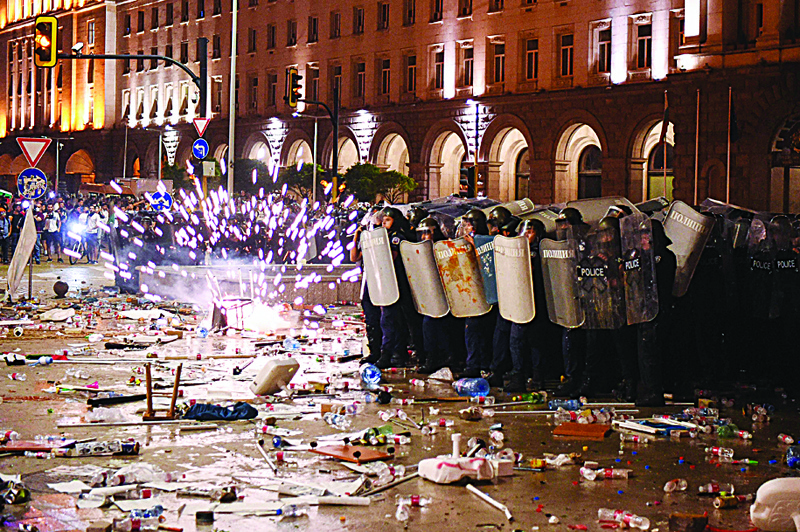
SOFIA: Anti-riot police guarding the Bulgarian parliament weathered smokebombs, firecrackers and stones on Wednesday as the latest in two months of anti-government protests took a violent turn, with at least 55 people hurt and nearly 100 arrested. The rally outside parliament came during a long, tense day in which a controversial draft for a new constitution was proposed in a bid to end the protests that call for the prime minister to resign for alleged corruption and protecting oligarchs.
Organisers who insist the rallies are supposed to be peaceful said they did not know who threw the projectiles in what was the most violent day yet, one in which hospital officials reported 37 police officers and 18 other people were hurt, including several journalists. Police said they arrested 60 people in the evening clashes, bringing the total to 95 arrests. They added some of them were extremists known as football ultras and said the protesters must have been aware of their presence.
Over 100 smoke bombs and firecrakers as well as stones, bottles and other objects flew at police surrounding the parliament building after 9:30 pm. Police with shields stormed the protesters and cleared a large perimeter of the square. Security forces brought in a water cannon and warned that it would be used unless protesters dispersed. Television footage showed several people being dragged and detained by police as officers attended to injured colleagues during the evening protests.
Demonstrators have been blocking roads and staging daily protests in the capital Sofia and other cities for close to two months, pressing for the resignation of Prime Minister Boyko Borisov and chief prosecutor Ivan Geshev over their perceived links with behind-the-scenes oligarchs. Borisov has already sacked several key ministers and recently proposed adopting a new constitution, but the protesters have dismissed these moves.
Thousands of demonstrators took to the streets of central Sofia from early Wednesday, shouting "Resign" and "Mafia" as parliament met to start discussing a project for a new constitution aimed at quelling weeks of anti-government rallies. Protesters threw paving stones, eggs, apples and tomatoes at police at several points earlier during the day.
Trust 'definitely lost'
Officers moved to disperse the crowd with stun grenades, pepper spray and tear gas. Hospital officials giving an earlier toll said 45 people had been hurt. Six were hospitalized for injuries including chemical burns and breathing problems. Sofia city police chief Georgy Hadzhiev denied accusations by the Bulgarian Helsinki Committee rights NGO that the police had used disproportionate force.
Hadzhiev said earliet Wednesday that over 35 people were arrested, most of them football ultras with previous criminal records. The clashes came at the start of parliament's autumn session on Wednesday, which is expected to discuss a proposal for a new constitution that stands little chance of success. Borisov's GERB party garnered the necessary support from over 120 lawmakers to put the project forward but it looks highly unlikely to gain the 160 votes which would be needed for it to progress to the next stage of adoption.
In a statement inside parliament, President Rumen Radev, who has voiced support for the protesters' demands, called on lawmakers to "emerge from the crisis with dignity" by paving the way for early elections. "Confidence is definitely lost," he said. Borisov, who has been in power almost without interruption for more than a decade, has so far refused to resign before his third term expires in March next year. Analysts have dismissed the conservative premier's proposal for a new constitution as an attempt to win time and cling to office.
Activists too have slammed it for failing to improve the accountability of the chief prosecutor -- an issue long highlighted by Bulgarian and international observers as well as the European Court of Human Rights -- while trying to limit the rights of the president. Thirteen years after joining the EU, Bulgaria remains its poorest and most graft-ridden member, according to Transparency International's corruption perceptions index. Many of the protesters that AFP talked to on Wednesday urged for the European Union to take a stance regarding the situation in the country.- AFP




